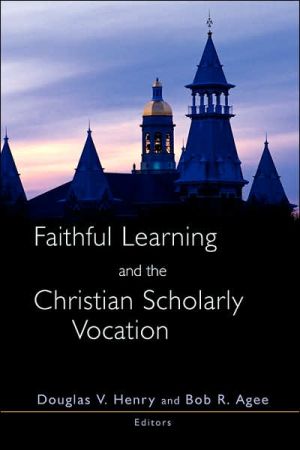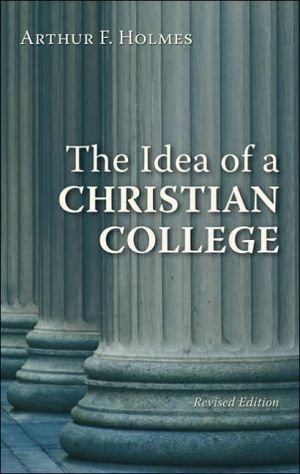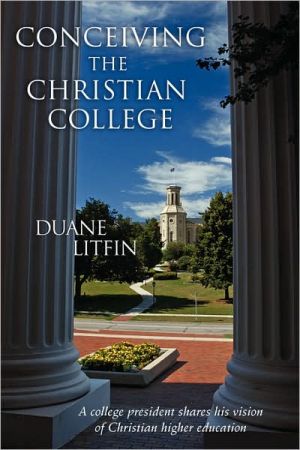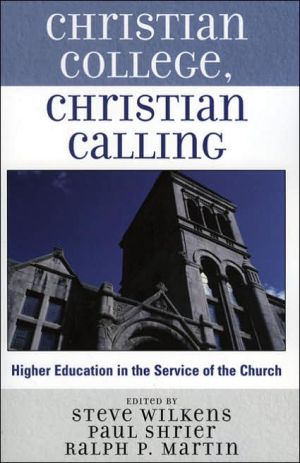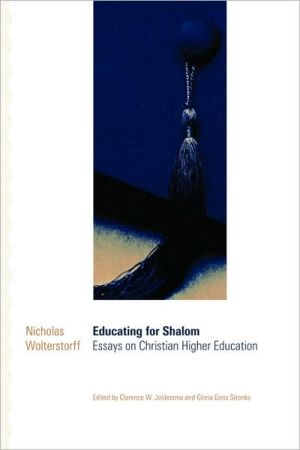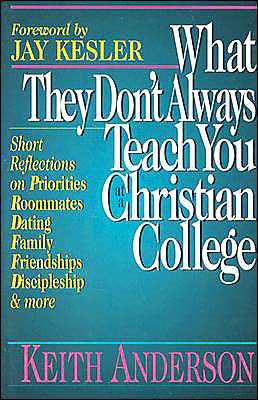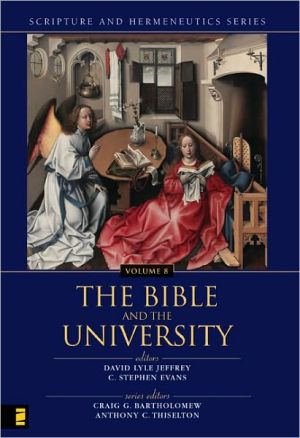Faithful Learning and the Christian Scholarly Vocation
Christian scholars and teachers everywhere are exploring ever more fully the relationship between Christian faith and the various academic disciplines. Faithful Learning and the Christian Scholarly Vocation makes a singular contribution to this ongoing endeavor. Leading voices in the Christian academy here provide a solid theological foundation for understanding the aims and practice of faith-and-learning integration, especially within church-related institutions, and also pointedly discuss...
Search in google:
Christian scholars and teachers everywhere are exploring ever more fully the relationship between Christian faith and the various academic disciplines. Faithful Learning and the Christian Scholarly Vocation makes a singular contribution to this ongoing endeavor. Leading voices in the Christian academy here provide a solid theological foundation for understanding the aims and practice of faith-and-learning integration, especially within church-related institutions, and also pointedly discuss some major challenges and opportunities facing Christian higher education in the twenty-first century. Contributors: Bob R. AgeeAnthony CampoloJoel A. CarpenterC. Stephen EvansNathan O. HatchDouglas V. HenryArthur F. HolmesRichard T. HughesDenton LotzMartin E. MartyParker J. Palmer
Faithful Learning and the Christian Scholarly Vocation\ \ Wm. B. Eerdmans Publishing Company\ Copyright © 2003 Wm. B. Eerdmans Publishing Company\ All right reserved.\ ISBN: 0-8028-1398-4 \ \ \ Introduction\ Bob R. Agee and Douglas V. Henry \ With growing earnestness and understanding, Christian scholars of late have explored better ways of relating Christian faith to various academic disciplines. Many have with new energy conducted research and published work concerning the implications of Christian faith for their disciplines, and have done so at the level of presuppositions, methodologies, and conclusions. Others have attended to what it takes for institutions with roots in a faith heritage to be unapologetically Christian in their approach to the teaching and learning process. George Marsden, Mark Noll, Richard Hughes, Joel Carpenter, Robert Benne, Arthur Holmes, Robert Sloan, and countless others have emerged as leaders in the effort to stimulate thought about the important task of expressing Christian faith in the academic world. As books and papers and lecturers on the issues have become more visible, a host of major issues have been raised.\ Not least among these issues is a sharpened awareness of the need for Christian voices in various academic disciplines, for such voices have the potential to advance learning and enrich Christian understanding while witnessing to the love of God with heart, soul, and mind. The opportunities for Christian engagement with important academic issues are legion. For example, the failure to distinguishbetween metaphysical and methodological naturalism has often fostered unnecessary points of tension between science and religion. That scientists embrace the latter by no means entails that they countenance the former, a point with numerous implications for the study of biological evolution, cosmology, and the environment. In the social sciences, a well-formed Christian anthropology can help critique reductive accounts of human behavior and methods for dealing with human behavior, such as those that undermine moral responsibility by presuming a deterministic behaviorism. In the professional disciplines, matters of practice can and often do generate tension between state of the art technique and the teachings of Scripture, and call for perceptive theological analysis in the service of Christian faithfulness. In short, the Christian faith bears significance for the way we understand our world, the way we address human development, the way we define humanity's place on the planet, and the way we explain the pilgrimage and destiny of humanity.\ Perhaps unfortunately, there is no clear-cut, universally agreed upon way of being responsive as Christian academics to our different disciplines. There is no creed that tells us how points of tension should be understood or resolved. The nuances of Scripture, the profundity of the faith, and the complexity of the world render formulaic prescriptions for integrating faith and learning trite at best, and misleading at worst. This means that the very thing for which needs are greatest is also among the more difficult endeavors of Christian intellectual faithfulness.\ To make matters worse, few faculty have had the opportunity during their graduate studies to think through these issues in any kind of formal way. Most faculty with terminal degrees pursue their graduate education in secular settings. Because mainstream graduate schools tend toward apathy - and occasionally antipathy - regarding Christian faith and thought, Christian graduate students likewise tend to avoid making their faith a central category by which to organize their academic efforts. In some fields, great emphasis is placed upon "objectivity," with the result that admitting value judgments or personal perspective into one's work is proscribed, notwithstanding the impossibility of a "view from nowhere." Consequently, not enough faculty come to the project of Christian higher education having had sufficient occasions to talk with others about the significance of Christian faith for their disciplines. The end result can be the formation of fine Christian persons competent in their fields, but who lack understanding of the ways that Christian faith should shape their work.\ Further, hiring professors who have sound academic credentials and who are active members of Christian churches does not guarantee that Christian education is going to take place. Contemporary culture makes it easier than ever to fragment life so that people can profess strong religious belief on Sunday, but see it as having little bearing on what they do in their work. Academicians are no exception to this trend toward compartmentalization, and active efforts are needed to combat it.\ For all of these reasons and more, we must conscientiously, deliberately explore the relationship of Christian faith to the various disciplines within the academy, engaging one another in dialogue and debate about how to realize fidelity to biblically based Christian faith, and doing so not in spite of but precisely because of our scholarly vocation. Such dialogue should not attempt to produce a uniform set of simple solutions to the dilemmas. Reductionism is unproductive whether or not it derives from Christian sources. Such exploration can, however, help to make us more aware of the hazards of ideas that are unfaithful to the Lord; more sensitive to our students and to the biases, prejudices, and perspectives they bring to our classrooms; and more prepared to model well-integrated Christian commitment of heart, soul, and mind within and without the church.\ The profession of scholar/teacher has attracted a multitude of dedicated Christian believers who will welcome the opportunity to explore faith issues within their fields of study. We believe that God calls people into the teaching and scholarly professions just as much as he does to any ministerial or missionary profession. Many have found such calling lived out by teaching within an institution with an unapologetic Christian faith heritage and perspective. Others have found their calling lived out within public colleges and universities. The issues raised in this book are not limited in significance to those who teach within the church-related college or university. They are much broader in scope and appeal to any Christian scholar/teacher willing to contemplate and converse about what it means to be Christian in the academic world.\ It is our hope that this edited volume will encourage continued attention to the faith and learning emphasis so important to the revitalization of the Christian academy. It is our further hope that academic leaders will make the study of faith and learning issues an ongoing component of faculty development programs. The issues are so numerous, and the Christian faith so comprehensive in scope and application, that it will take more than our lifetimes to exhaust the topics of concern.\ Faithful Learning and the Christian Scholarly Vocation helps in this effort by exploring the relationship between Christian faith and intellectual life. It offers a theological foundation for understanding the motives, aims, and practice of faith and learning integration within the academy, and then goes on to consider some of the important intellectual challenges and opportunities faced by Christian higher education in the twenty-first century. Chapters in the first section survey the nature and shape of Christian higher education, attending to the theological imperative to integrate faith and learning. Specific issues broached include the theological resources borne within varied Christian traditions for the intellectual life, the professorate as a response to God's call, and the relation of Christian higher education to the mission of the church. Contributions in the second section examine challenges and opportunities presently faced by Christian higher education, including the erosion of public trust in higher education, escalating moral relativism, the proliferation of narcissistic and self-indulgent behaviors, and the likelihood of increased conflict among civilizations. Reflection questions at the end of each chapter prompt thoughtful reading and provide stimulus for collaborative discussion of the most critical issues of Christian higher education.\ Varied academic disciplines, theological perspectives, and practical experiences are united in this volume, useful for faculty, students, and patrons of Christian higher education alike. The book encourages reflective action on the part of its readers, showing that faith and learning integration must not be merely institutional rhetoric, armchair recreation, or pedagogical postscript, but the sine qua non of Christian higher education. For this reason, we hope that you, like Augustine of Hippo, will not only hear a word to "take up and read," but having done so, will also live out through keen awareness, careful discussion, hard work, and joyous accomplishment the highest ideals of Christian scholarly faithfulness.\ (Continues...)\ \ \ \ \ Excerpted from Faithful Learning and the Christian Scholarly Vocation Copyright © 2003 by Wm. B. Eerdmans Publishing Company . Excerpted by permission.\ All rights reserved. No part of this excerpt may be reproduced or reprinted without permission in writing from the publisher.\ Excerpts are provided by Dial-A-Book Inc. solely for the personal use of visitors to this web site. \ \
AcknowledgmentsIntroduction1Christian Faith and the Life of the Mind32The Calling of the Christian Scholar-Teacher263The Church and Christian Higher Education in the New Millennium504The Mission of Christian Scholarship in the New Millennium625Toward a Spirituality of Higher Education756Christian Thinking in a Time of Academic Turmoil877The Closing of the American Mind and the Opening of the Christian Mind: Liberal Learning, Great Texts, and the Christian College1018Christian Higher Education and the Conversion of the West1239The Challenge of Radical Christianity for the Christian College13910Christian Higher Education in the Twenty-First Century and the Clash of Civilizations158Contributors176
